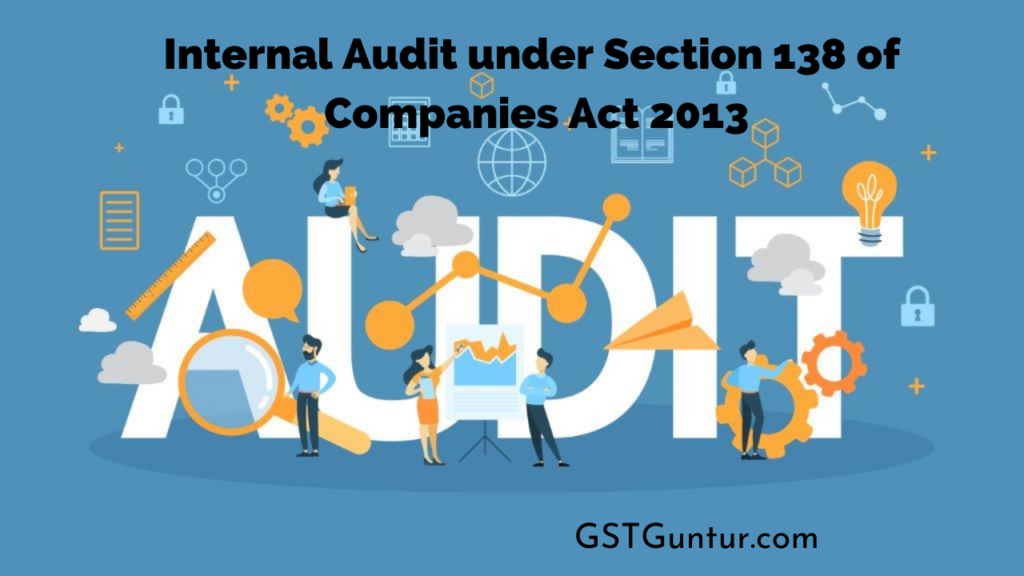Internal Audit under Section 138 of Companies Act, 2013: The internal audit assesses a company’s interior control, inclusive of its corporate governance and accounting methods. These audits pledge compliance with laws and regulations and help to maintain precise and timely financial reporting and data collection.
- According to section 138 of the Indian Companies Act, 2013 along with Rule 13 Of Companies (Accounts) Rules 2014
- Significant points
According to Section 138 of Indian Companies Act, 2013 Along with Rule 13 Of Companies (Accounts) Rules 2014
A particular specific class requires the appointment of Internal Auditors of companies. An excerpt of Rule 13 of Companies (Accounts) Rules, 2014 is mentioned below-
“13. Companies required to appoint internal auditor”: The companies which are required to appoint or hire an internal auditor are listed below:
| Serial number | Companies required to appoint an internal auditor | Applicability |
| (a) | Every listed company | Always applicable |
| (b) | Every unlisted public company |
|
| (c) | All unlisted private company |
|
Given that any existing company coming under any of the conditions mentioned above will comply with the necessities of section 138 and the said rule within six months of the foundation of such section.
Clarification: (For the persistence of this rule)
- There is no compulsion regarding the internal auditor being the employee of the company.
- The Audit Committee of the company should consult with the Internal Auditor, formulate the scope, methodology, functioning, and periodicity for conducting the internal audit.
- The Internal auditor might be a Chartered Accountant (CA) or Cost and Works Accountancy (CWA), or any other professional. The duties and responsibilities are specified neither in the rules nor in the Act. So, therefore, even if the regulations and Act state that the appointment of Internal Auditor is mandatory, the same rules and Act also provides the option for the companies to appoint any person as internal auditors”.
Shortcut
I-LCD: I stands for Income, L for Loan, C for Capital, and D for Deposit. This section provides indirect ways and opportunities to all internal auditors, and hence it is known as the auditor’s gift.
Note: In the case of listed companies, I-LCD is always applicable. In the case of unlisted companies (public and private), I-LCD is not always suitable.
Significant Points
- The prior fiscal year is to be considered for the checking of the limits as mentioned above. For example, for checking the applicability of Section 138 of the Indian Companies Act 2013 (Internal Auditor) for the fiscal year 2020-21, the fiscal year 2019-20 is to be taken into attention.
- To easily remember the limits mentioned above, the limit decreasing method in the same proportion should be considered, i.e., the loan is half of the income, capital is half of the loan, and henceforth.
- The listed companies have to obey Section 138 of the companies act 2013 regardless of the above limit.
- For private unlisted companies, there are two limits to check out the section’s applicability, namely, Income and Loan.
- An internal auditor should be a chartered accountant or a cost accountant, or such other professional selected by the board to conduct the company’s Internal Audit of functions and activities.
For easy accessibility, the excerpt of Section 138 of the Companies Act, 2013 is reproduced:
Section 138, Internal audit
- The mentioned class or classes of companies will be required to appoint an internal auditor, who will be a chartered accountant or a cost accountant, or any other professional decided by the board to conduct an indoor audit of the functions and activities for the corporate.
- The Central Government, following specific rules, may prescribe the manner and the intervals in which the internal audit will be conducted and reported to the board.
